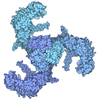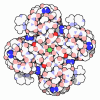+ Open data
Open data
- Basic information
Basic information
| Entry | Database: PDB / ID: 6w85 | ||||||
|---|---|---|---|---|---|---|---|
| Title | K2P2.1 (TREK-1):ML335 complex, 200 mM K+ | ||||||
 Components Components | Potassium channel subfamily K member 2 | ||||||
 Keywords Keywords | METAL TRANSPORT /  ion channel / K2P / TREK1 / ion channel / K2P / TREK1 /  TREK-1 TREK-1 | ||||||
| Function / homology |  Function and homology information Function and homology informationTWIK related potassium channel (TREK) / Phase 4 - resting membrane potential / positive regulation of cellular response to hypoxia / cardiac ventricle development / stabilization of membrane potential / potassium ion leak channel activity / negative regulation of cardiac muscle cell proliferation / astrocyte projection / potassium channel inhibitor activity / outward rectifier potassium channel activity ...TWIK related potassium channel (TREK) / Phase 4 - resting membrane potential / positive regulation of cellular response to hypoxia / cardiac ventricle development / stabilization of membrane potential / potassium ion leak channel activity / negative regulation of cardiac muscle cell proliferation / astrocyte projection / potassium channel inhibitor activity / outward rectifier potassium channel activity / negative regulation of DNA biosynthetic process / cochlea development /  voltage-gated potassium channel activity / voltage-gated potassium channel activity /  calyx of Held / response to axon injury / calyx of Held / response to axon injury /  voltage-gated potassium channel complex / axon terminus / response to mechanical stimulus / potassium ion transmembrane transport / voltage-gated potassium channel complex / axon terminus / response to mechanical stimulus / potassium ion transmembrane transport /  regulation of membrane potential / potassium ion transport / regulation of membrane potential / potassium ion transport /  memory / cellular response to hypoxia / apical plasma membrane / G protein-coupled receptor signaling pathway / memory / cellular response to hypoxia / apical plasma membrane / G protein-coupled receptor signaling pathway /  axon / neuronal cell body / axon / neuronal cell body /  cell surface / cell surface /  endoplasmic reticulum / endoplasmic reticulum /  plasma membrane plasma membraneSimilarity search - Function | ||||||
| Biological species |   Mus musculus (house mouse) Mus musculus (house mouse) | ||||||
| Method |  X-RAY DIFFRACTION / X-RAY DIFFRACTION /  SYNCHROTRON / SYNCHROTRON /  MOLECULAR REPLACEMENT / Resolution: 3.8 Å MOLECULAR REPLACEMENT / Resolution: 3.8 Å | ||||||
 Authors Authors | Lolicato, M. / Minor, D.L. | ||||||
| Funding support |  United States, 1items United States, 1items
| ||||||
 Citation Citation |  Journal: Sci Adv / Year: 2020 Journal: Sci Adv / Year: 2020Title: K 2P channel C-type gating involves asymmetric selectivity filter order-disorder transitions. Authors: Lolicato, M. / Natale, A.M. / Abderemane-Ali, F. / Crottes, D. / Capponi, S. / Duman, R. / Wagner, A. / Rosenberg, J.M. / Grabe, M. / Minor Jr., D.L. | ||||||
| History |
|
- Structure visualization
Structure visualization
| Structure viewer | Molecule:  Molmil Molmil Jmol/JSmol Jmol/JSmol |
|---|
- Downloads & links
Downloads & links
- Download
Download
| PDBx/mmCIF format |  6w85.cif.gz 6w85.cif.gz | 231.9 KB | Display |  PDBx/mmCIF format PDBx/mmCIF format |
|---|---|---|---|---|
| PDB format |  pdb6w85.ent.gz pdb6w85.ent.gz | 185.3 KB | Display |  PDB format PDB format |
| PDBx/mmJSON format |  6w85.json.gz 6w85.json.gz | Tree view |  PDBx/mmJSON format PDBx/mmJSON format | |
| Others |  Other downloads Other downloads |
-Validation report
| Arichive directory |  https://data.pdbj.org/pub/pdb/validation_reports/w8/6w85 https://data.pdbj.org/pub/pdb/validation_reports/w8/6w85 ftp://data.pdbj.org/pub/pdb/validation_reports/w8/6w85 ftp://data.pdbj.org/pub/pdb/validation_reports/w8/6w85 | HTTPS FTP |
|---|
-Related structure data
| Related structure data | 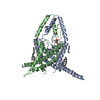 6w7bC  6w7cC 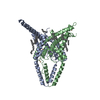 6w7dC 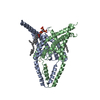 6w7eC 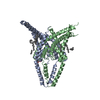 6w82C  6w83C 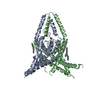 6w84C 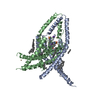 6w86C  6w87C 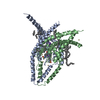 6w88C  6w8aC  6w8cC  6w8fC 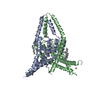 6cq6S C: citing same article ( S: Starting model for refinement |
|---|---|
| Similar structure data |
- Links
Links
- Assembly
Assembly
| Deposited unit | 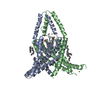
| ||||||||
|---|---|---|---|---|---|---|---|---|---|
| 1 |
| ||||||||
| Unit cell |
|
- Components
Components
-Protein , 1 types, 2 molecules AB
| #1: Protein | Mass: 34303.938 Da / Num. of mol.: 2 Mutation: K84R, Q85E, T86K, I88L, A89R, Q90A, A92P, N95S, S96D, T97Q, N119A, S300A, E306A Source method: isolated from a genetically manipulated source Source: (gene. exp.)   Mus musculus (house mouse) / Gene: Kcnk2 / Production host: Mus musculus (house mouse) / Gene: Kcnk2 / Production host:   Komagataella pastoris (fungus) / References: UniProt: P97438 Komagataella pastoris (fungus) / References: UniProt: P97438 |
|---|
-Non-polymers , 6 types, 16 molecules 


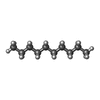
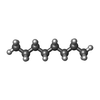
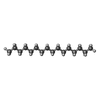





| #2: Chemical | ChemComp-K / #3: Chemical | #4: Chemical | #5: Chemical |  Decane Decane#6: Chemical |  Octane Octane#7: Chemical | ChemComp-R16 / |  Hexadecane Hexadecane |
|---|
-Details
| Has ligand of interest | N |
|---|
-Experimental details
-Experiment
| Experiment | Method:  X-RAY DIFFRACTION / Number of used crystals: 1 X-RAY DIFFRACTION / Number of used crystals: 1 |
|---|
- Sample preparation
Sample preparation
| Crystal | Density Matthews: 4 Å3/Da / Density % sol: 69.28 % |
|---|---|
Crystal grow | Temperature: 277 K / Method: vapor diffusion, hanging drop / pH: 8 Details: 22-25% PEG400, 100mM HEPES pH=8.0, 1mM CdCl2, 200mM KCl |
-Data collection
| Diffraction |
| ||||||||||||||||||
|---|---|---|---|---|---|---|---|---|---|---|---|---|---|---|---|---|---|---|---|
| Diffraction source |
| ||||||||||||||||||
| Detector |
| ||||||||||||||||||
| Radiation |
| ||||||||||||||||||
| Radiation wavelength |
| ||||||||||||||||||
| Reflection | Resolution: 3.8→47.65 Å / Num. obs: 11399 / % possible obs: 99.9 % / Redundancy: 5.9 % / Rmerge(I) obs: 0.124 / Net I/σ(I): 6.6 | ||||||||||||||||||
| Reflection shell | Resolution: 3.8→4.25 Å / Num. unique obs: 3165 / CC1/2: 0.113 |
- Processing
Processing
| Software |
| ||||||||||||||||||||||||||||||||||||||||||||||||||||||||||||||||||||||||
|---|---|---|---|---|---|---|---|---|---|---|---|---|---|---|---|---|---|---|---|---|---|---|---|---|---|---|---|---|---|---|---|---|---|---|---|---|---|---|---|---|---|---|---|---|---|---|---|---|---|---|---|---|---|---|---|---|---|---|---|---|---|---|---|---|---|---|---|---|---|---|---|---|---|
| Refinement | Method to determine structure : :  MOLECULAR REPLACEMENT MOLECULAR REPLACEMENTStarting model: 6cq6 Resolution: 3.8→14.98 Å / Cor.coef. Fo:Fc: 0.941 / Cor.coef. Fo:Fc free: 0.93 / Cross valid method: THROUGHOUT / SU Rfree Blow DPI: 0.687
| ||||||||||||||||||||||||||||||||||||||||||||||||||||||||||||||||||||||||
| Displacement parameters | Biso mean: 234.69 Å2
| ||||||||||||||||||||||||||||||||||||||||||||||||||||||||||||||||||||||||
| Refine analyze | Luzzati coordinate error obs: 0.79 Å | ||||||||||||||||||||||||||||||||||||||||||||||||||||||||||||||||||||||||
| Refinement step | Cycle: LAST / Resolution: 3.8→14.98 Å
| ||||||||||||||||||||||||||||||||||||||||||||||||||||||||||||||||||||||||
| Refine LS restraints |
| ||||||||||||||||||||||||||||||||||||||||||||||||||||||||||||||||||||||||
| LS refinement shell | Resolution: 3.8→3.85 Å
| ||||||||||||||||||||||||||||||||||||||||||||||||||||||||||||||||||||||||
| Refinement TLS params. | S22: 0.0042 Å ° / Method: refined / Refine-ID: X-RAY DIFFRACTION
| ||||||||||||||||||||||||||||||||||||||||||||||||||||||||||||||||||||||||
| Refinement TLS group |
|
 Movie
Movie Controller
Controller




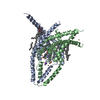
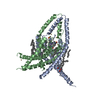
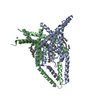

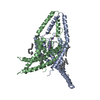

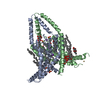


 PDBj
PDBj